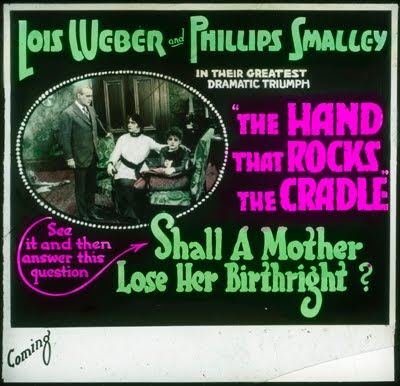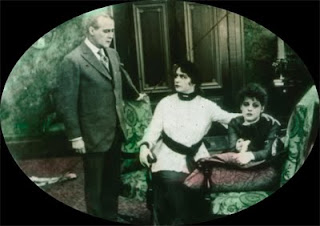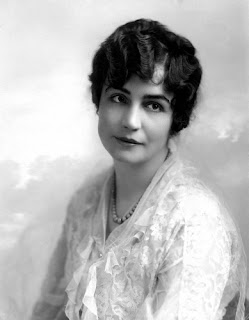Shelley Stamp: Lois Weber and “The Hand That Rocks the Cradle”
August 6, 2010
Please welcome a very special guest contributor to STARTS THURSDAY! Film scholar, historian, author, and friend: Shelley Stamp.

One of the most forceful films ever made in support of legalizing birth control, The Hand That Rocks the Cradle features director and screenwriter Lois Weber playing a doctor’s wife arrested and imprisoned for illegally disseminating family planning information. It was one of many films on the subject released in 1916 and 1917 just as Margaret Sanger, the era’s most celebrated family planning advocate, stepped up her campaign for “voluntary motherhood.” Produced even as Sanger’s legal battle unfolded, the films drew explicitly on her headline-generating activism. In 1916 Weber had written and directed her first film on the topic, Where Are My Children?, a title so popular it was Universal’s top money-maker that year. The film’s portrayal of a doctor tried for circulating contraceptive advice was “plainly indicative of the Margaret Sanger case,” according to one critic. Sanger devised the idea of making her own film while imprisoned on obscenity charges that same year. In Birth Control, released in 1917, Sanger guides viewers through a series of arguments in favor of legalizing contraception illustrated with incidents from her own storied career.

If even disseminating contraceptive advice remained a felony during these years, it is no wonder that films like The Hand That Rocks the Cradle encountered significant censorship battles. When the film opened in New York, just two weeks after Sanger’s Birth Control, that city’s license commissioner attempted to stop the premiere, as he had done with Sanger’s film, on the grounds that a subject which itself remained illegal did not constitute legitimate “theatrical entertainment.” Universal defended its release in an aggressive publicity campaign waged in the city’s dailies: newspapers and magazines have carried extensive discussions of the issue, the studio noted, and “the legitimate stage has no difficulty in presenting the topic when it wishes.” In fact, contraception was being discussed everywhere “except on the screen,” Universal protested. Why should those who could not afford two-dollar theater tickets be prevented from forming an opinion at 25-cent movie shows? But the studio’s campaign was ultimately unsuccessful. Following its legal troubles in New York, The Hand That Rocks the Cradle played mainly in southern and western states, avoiding powerful censorship boards in the northeast and Midwest. As a result, it did not attain the record-breaking attendance set by Where Are My Children? the previous year. When The Hand That Rocks the Cradle opened at Clune’s Auditorium in Los Angeles that June, Weber appeared on stage, bitterly denouncing attempts to alter or suppress her film.

The Hand That Rocks the Cradle is now lost, but the surviving script and accompanying marketing materials make it clear that Weber mounted an unstinting argument in favor of “voluntary motherhood.” The film’s politics, barely alluded to in this slide’s tag line – “Shall a Mother lose her birth right? – were stated much more boldly in the film’s original title, “Is a Woman a Person?” Weber’s character, Louise Broome, is intent on circulating family planning information to privileged and impoverished women alike. But, as one of the film’s heralds explains, police “forbade her to speak to women about the great secret which was an open one to rich women; a closed one to the poor.” Arrested and imprisoned, Louise refuses to back down from her cause and begins a hunger strike. After she is pardoned in the end, Louise’s husband finally agrees that physicians ought to provide patients with instructions on family planning. At the film’s close, newspaper headlines announce that birth control may soon be legal in the state of Illinois, asking viewers “Why do you think?”
The Hand That Rocks the Cradle marked Weber’s last appearance on screen and her final project for Universal where she had made a series of popular features on other social issues like poverty, addiction and capital punishment. Shortly after completing the film, she formed her own production company, signing such a lucrative distribution deal with her old studio that she became the highest paid director in the business. Although Weber vowed to abandon the “heavy dinners” she had made at Universal in favor of lighter fare, the films she would write and direct for Lois Weber Productions, including The Blot and Too Wise Wives, contain pointed commentary on marriage, class, domesticity and relations between the sexes.
--- SHELLEY STAMP
Shelley Stamp is the author of Movie-Struck Girls: Women and Motion Picture Culture after the Nickelodeon and numerous essays on women and early film culture. Her audio commentary can be heard on recent DVD releases of The Blot, Traffic in Souls and Where Are My Children? She is Professor Film & Digital Media at the University of California, Santa Cruz.
